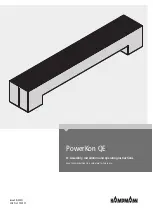
GRUNDIG Service
2 - 10
CUC 7303 F
Description des circuits / Circuit Description
3.5 Sound IF
After the ceramic filter F926, the sound signal is superimposed at
IC150-(5) on a direct voltage for setting the volume level. Demodula-
tion is effected by a PLL demodulator.
In one path, the demodulated and uncontrolled AF signal is fed out at
IC150-(1), it is then amplified by the transistors CT917, CT916 and
passed on to the Scart socket.
In another path, the demodulated and controlled AF signal is present
at IC150-(50) and is fed to the AF-IC TDA7233.
3.6 Luminance and Chrominance Signal
Calibration and control is effected automatically during the frame
blanking period. The signals are adjusted by a positive or negative
current entering the integration capacitor CC177 at IC150-(12). During
the scanning period the control voltage is clamped.
The luminance signal passes through the colour trap integrated in the
IC. The delay line provided in the IC is used to correct delay time
differences between the luminance and chrominance signal. The
colour transient improvement (peaking) which follows is also realized
in this IC. For this, the steepness of the leading and trailing edges of
the Y-signal is improved. The internal chroma filter separates the
chrominance signal from the CCVS signal. A control circuit adjusts the
amplitude of the colour signal for the chroma limiter and chroma
control. The resulting chroma signal is passed on to the colour
demodulator. From this chroma signal, the burst is separated which is
used to synchronise the colour oscillator in phase and frequency. The
quartz establishes a fixed 4.43MHz frequency for the colour carrier at
Pin 35. The quartz is controlled by an internal PLL circuit. The
correction voltage is integrated via the time constant at Pin 33. By
means of the colour carrier, the colour component signals are then
demodulated and leave IC150 as R-Y and B-Y signals at Pin 30 and
Pin 31 respectively. Following the PAL delay at CIC105 TDA4665 the
two signals, B-Y and R-Y, are fed back to IC150-(28), -(29) TDA8362A
where they are clamped.
Subsequently, the colour contrast is controlled at IC150-(26). In the
matrix, the RGB signals are produced from the amplified signals and
the Y-component.
3.7 SECAM Signal Path and Automatic PAL-SECAM Switching
The chroma signal of approx. 300mV for the SECAM-IC110 is present
at IC150-(27).
On SECAM mode, a voltage between 5.6V…5.8V is applied to
IC110-(16). When the IC110 identifies the SECAM standard from the
chroma signal at pin 16, a current source at pin 1 is activated and sends
a SECAM identification to IC150-(32). As soon as IC150 too has
identified SECAM, this IC sets pin 32 to 5V (1.5V on PAL). This direct
voltage is superimposed either by a regular clock frequency on PAL,
or by bursts at a frequency of 4.43 MHz on SECAM.
The IC110 interprets these as an acknowledgement and switches the
difference signal outputs R-Y and B-Y (pins 9 and 10) to 3.5V DC (1.5V
on PAL ). The difference signal outputs of IC150-(30), -(31) are thus
blocked. IC110 now supplies the R-Y and B-Y signals. The difference
signals are returned to IC150 via the delay line CIC105. The following
path of these signals is described under 3.6 "Luminance and
Chrominance Signal".
On SECAM reception the DC Level is switched to 3.5V at IC110-(10).
Via CT115, U
PAL
changes to "Low" (PAL="High") and
µ
P IC850-(1) is
able to identify PAL or SECAM on ATS search (only FR variants).
On OIRT reception (6.5MHz sound carrier), the search mode of the
µ
P
(U
PAL
) is switched over by CT915 via U
AUDIO
and CT115.
Filterung des Luminanz- und Chrominanzsignals
Luminance and Chrominance Filter
Schaltsignal vom Prozessor
Switching Signal from Processor
FBAS von HF
CCVS form RF
FBAS von Extern
External CCVS
Regelspannung für
die Calibrierung
Control Voltage
for Calibration
CH
Y
16
13
15
12
Farb-Trap
Colour Trap
Delay
Peaking
2dB
Autom.
Calibrierung
Auto Calibration
Farb-Filter
Chroma Filter
Farb-Limiter
Farb-Regler
Chroma Limiter
Chroma Control
Ton-ZF und Demodulation
Sound IF and Demodulation
Ton-ZF +
Lautstärkeregelung
Sound IF +
Volume Control
HPF
PLL
Demodulator
LPF
Ungeregelter
Ton Scart
Uncontrolled
Sound to Scart
Deemphasis
Geregelter Ton
Controlled Sound
Ton von Scart
Sound from Scart
Schaltsignal vom
Prozessor
Switching Signal
from Processor
5
6
16
50
1
LPF
















































